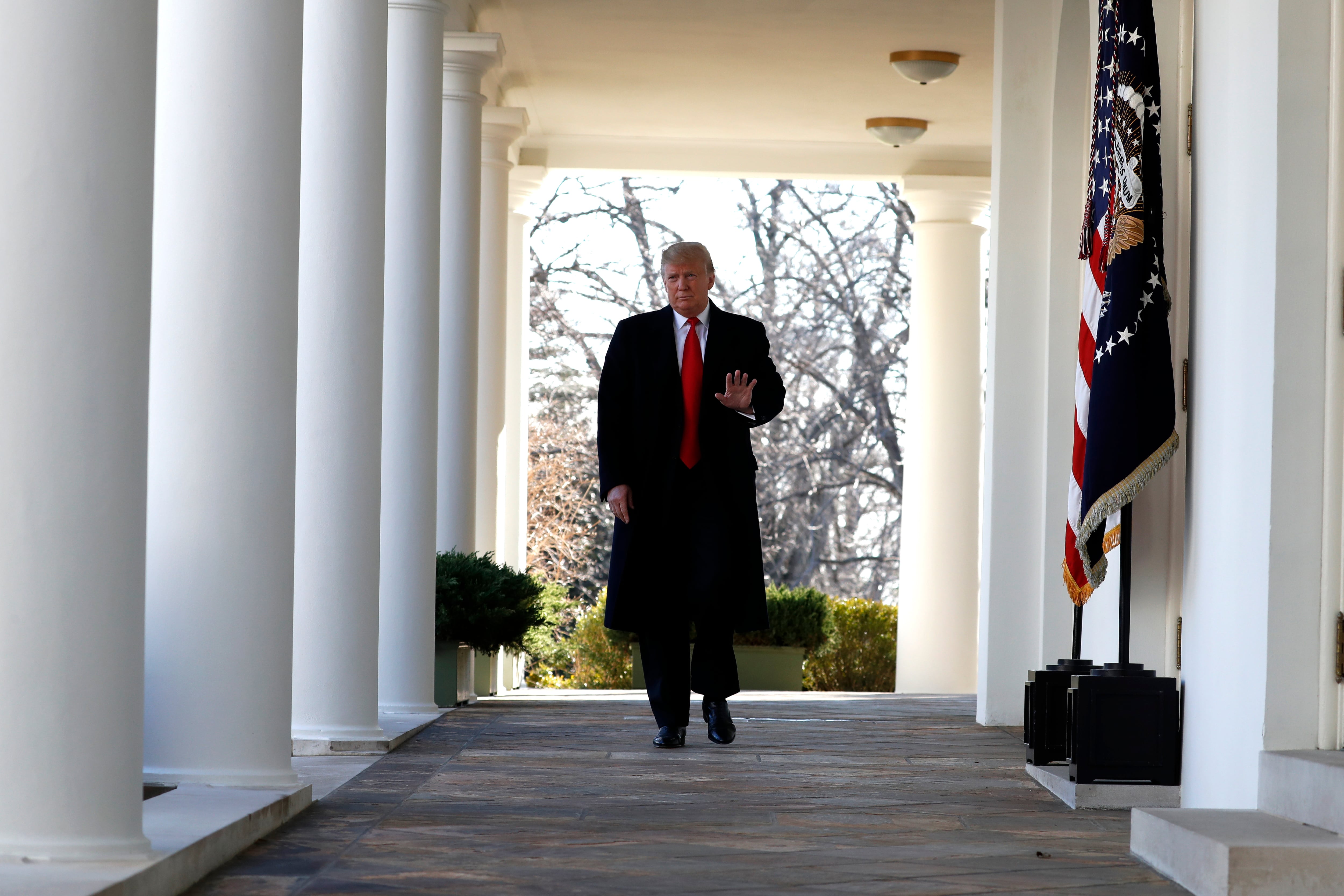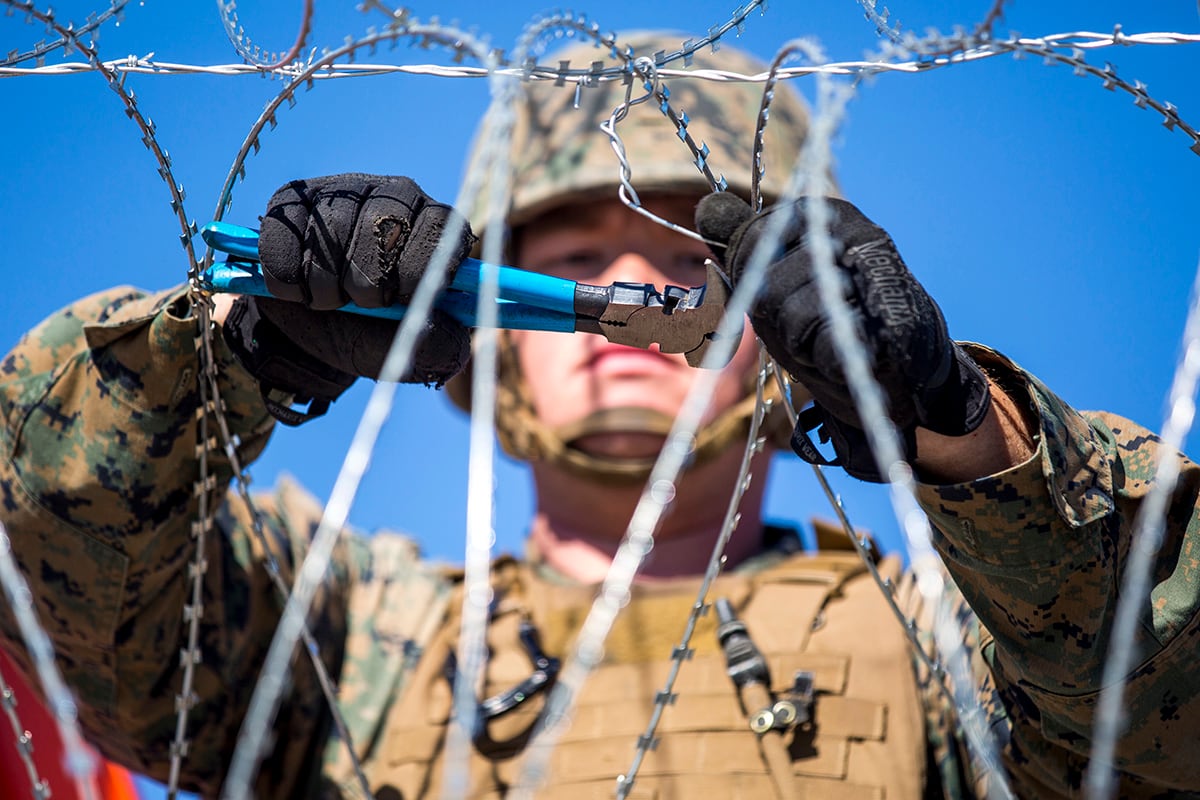WASHINGTON — President Donald Trump signaled on Thursday he will declare a national immigration emergency in coming days to get around congressional opposition to his controversial border wall project, possibly shifting billions in military funds to pay for the construction.
The announcement from the White House came as Trump announced he will sign a budget deal designed to avoid another government shutdown this weekend, even though the deal falls more than $4 billion short of the funding he requested for the wall project.
“President Trump will sign the government funding bill, and as he has stated before, he will also take other executive action — including a national emergency — to ensure we stop the national security and humanitarian crisis at the border,” White House spokeswoman Sarah Sanders said in a statement.
“The president is once again delivering on his promise to build the wall, protect the border, and secure our great country.”
RELATED

White House officials said they will announce more details on the emergency declaration in coming days. Senate lawmakers passed the new budget bill on Thursday afternoon, and House lawmakers were expected to follow suit Thursday evening.
Lawmakers have implored Trump in recent days to sign the deal to avoid another shutdown, but also panned the idea of using military funds for the wall. On Tuesday, Senate Armed Services Committee Chairman Jim Inhofe, R-Okla., said he supports the border security effort, but “I don’t want anything to degrade military construction.”
Congressional aides said it’s unclear what military funds Trump would tap to pay for the wall, but the emergency declaration gives him a wide range of executive powers to shift around the money.
About $21 billion in unobligated military construction funds from the last five years would be available. The money is connected to a host of planned housing, medical and logistics projects — both in the United States and overseas — but has not yet been spent.
The end result could mean multi-year delays for a host of construction projects military officials have deemed critical to force readiness.
Among the potential targets: a new vehicle maintenance shop at Camp Arifjan in Kuwait, drydock repairs at Joint Base Pearl Harbor-Hickam in Hawaii, F-35 hangar improvements at Luke Air Force Base in Arizona, ongoing hospital construction at Landstuhl Regional Medical Center in Germany, and new family housing builds in South Korea, Italy and Wisconsin.
Congressional officials said White House officials have given them no indication which projects may have their funding taken. Service officials would have to lobby for new money from lawmakers in the next budget cycle to recover those losses.
Democrats promised a legal challenge if Trump takes that step.
RELATED

“Declaring a national emergency would be a lawless act, a gross abuse of the power of the presidency and a desperate attempt to distract from the fact that President Trump broke his core promise to have Mexico pay for his wall,” Senate Democratic Leader Chuck Schumer, D-N.Y., and House Speaker Nancy Pelosi, D-Calif., said in a statement Thursday.
“It is yet another demonstration of President Trump’s naked contempt for the rule of law. This is not an emergency, and the president’s fearmongering doesn’t make it one.”
Outside experts also questioned the move. Mackenzie Eaglen, a resident fellow at the American Enterprise Institute, said making the declaration “will forever destroy precedent for what constitutes an 'emergency' under executive authority.” She predicted an immediate and lengthy court challenge.
Trump could take the funds from other accounts, including the Army Corps of Engineers and special counter narcotics programs. But the military construction accounts represent the likely largest and easiest ones to use.
“Funds taken from (those) projects will halt all work on whatever else was supposed to be done, likely degrading military readiness,” Eaglen said. “Not to mention, the funds will have to be replaced at some point anyway, thereby adding to the cost of the ‘emergency.’”
Sanders said White House officials see no basis for a legal challenge because “the president is doing his job, Congress should do theirs."
The two sides have been caught in a stalemate since last fall over funding for the southern border wall project. Democrats have repeatedly accused Trump of militarizing the immigration debate by deploying more than 5,000 active-duty troops to southern border states last fall — in addition to several thousand National Guard members — to support Department of Homeland Security operations there.
But the White House and military have defended the action as critical to national security, saying that migrant caravans in South and Central America pose a serious danger to U.S. sovereignty.
Leo covers Congress, Veterans Affairs and the White House for Military Times. He has covered Washington, D.C. since 2004, focusing on military personnel and veterans policies. His work has earned numerous honors, including a 2009 Polk award, a 2010 National Headliner Award, the IAVA Leadership in Journalism award and the VFW News Media award.








